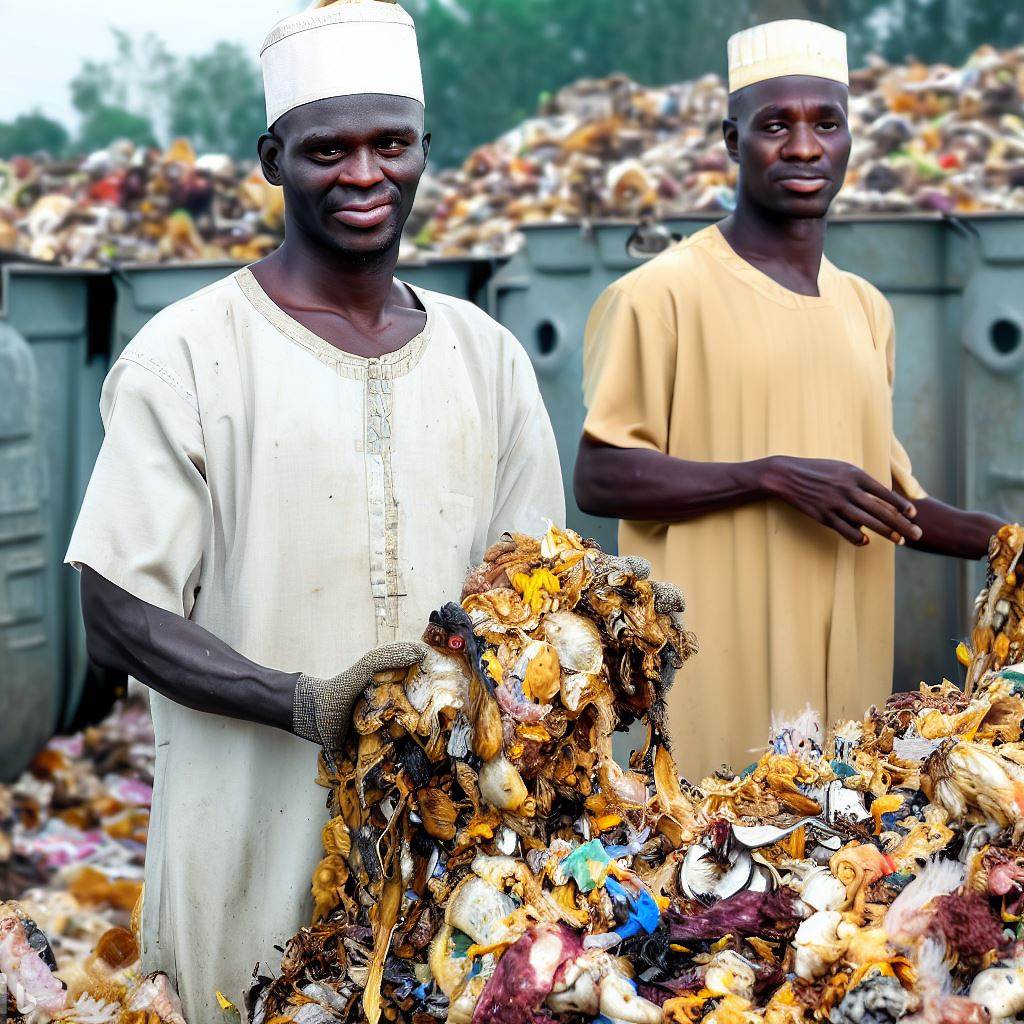Poultry Waste Management: Best Practices in Nigeria
Last Updated on August 23, 2023
Introduction to Poultry Waste Management
Poultry waste management plays a crucial role in maintaining environmental sustainability and public health.
It is imperative to address the importance of managing poultry waste effectively. In Nigeria, where poultry farming is a significant sector, proper waste management is vital.
Importance of Managing Poultry Waste
Managing poultry waste is essential for several reasons.
Firstly, it helps to reduce environmental pollution caused by excessive accumulation of waste.
Secondly, it prevents the spread of diseases and eliminates health risks for both humans and livestock.
Thirdly, adequate waste management improves soil fertility, benefiting agricultural practices.
Overview of the Current Situation in Nigeria
Unfortunately, Nigeria faces significant challenges in poultry waste management.
The lack of awareness and appropriate training among farmers contributes to inadequate waste disposal practices.
The majority of poultry farmers dispose of waste in open spaces, contaminating water sources and farmlands.
Furthermore, the inadequate infrastructure for waste management exacerbates the problem.
Insufficient facilities for waste treatment and proper disposal result in the accumulation of waste, leading to environmental degradation.
Additionally, the absence of stringent regulations and enforcement contributes to the prevailing situation.
In short, poultry waste management is crucial for maintaining environmental sustainability and public health in Nigeria.
The current situation calls for immediate intervention to raise awareness, provide training, and develop appropriate infrastructure.
The implementation of effective waste management practices is imperative to mitigate the negative impacts of poultry waste and ensure a sustainable future.
Understanding the challenges of poultry waste management in Nigeria
Lack of awareness and knowledge
- Many poultry farmers in Nigeria lack awareness about proper waste management practices.
- Limited knowledge on the harmful effects of improper waste disposal contributes to the problem.
- Inadequate understanding of the benefits and potential uses of poultry waste hinders its proper management.
Limited infrastructure and resources
- Insufficient waste management infrastructure makes it difficult to properly handle poultry waste.
- Lack of funding and resources limit the implementation of effective waste management systems.
- Inadequate equipment and facilities hinder poultry farmers from managing waste efficiently.
Environmental and health concerns
- Improper waste disposal methods result in environmental pollution, particularly of land and water.
- Contamination of water sources with poultry waste can lead to the spread of diseases.
- Exposure to harmful chemicals and pathogens in improperly managed waste poses health risks to farmers and communities.
Effective Poultry Waste Management is imperative for sustainable agriculture and environmental preservation in Nigeria.
Creating awareness among poultry farmers about proper waste practices and educating them on the benefits of efficient disposal is crucial.
To combat low awareness, government agencies and NGOs should conduct campaigns, training, and provide materials for Poultry Waste Management education.
This aids farmers in understanding waste’s harmful effects and its potential as a resource.
Investing in waste infrastructure is vital. Government funds should establish treatment facilities, disposal systems, and offer equipment.
Partnering with private entities and global organizations can provide expertise for sustainable waste management.
Enforcing strict regulations is essential for environmental and health concerns. Laws must be established and monitored to ensure proper disposal. Regular inspections prevent contamination and health risks.
The government could incentivize proper waste management through subsidies. Collaborating with experts can yield innovative waste technologies and uses like organic fertilizer.
In summary, Poultry Waste Management in Nigeria faces awareness, infrastructure, and environmental challenges.
Elevating awareness, enhancing infrastructure, and enforcing rules can result in better practices, benefiting agriculture, the environment, and public health.
Read: Guide to Starting a Poultry Farm in Nigeria: Steps & Tips
Best practices for poultry waste management in Nigeria
Implementing proper waste handling procedures
1. Importance of regular cleaning and disinfection
Regular cleaning and disinfection of poultry waste is essential to maintain hygiene and prevent disease outbreaks.
2. Using appropriate cleaning products and equipment
Using suitable cleaning products and equipment ensures effective removal and containment of poultry waste.
Utilizing waste as a valuable resource
1. Composting poultry waste for organic fertilizer
Composting poultry waste can be a cost-effective method to produce organic fertilizer for crop production.
2. Generating biogas from waste for energy production
By utilizing anaerobic digestion, poultry waste can be converted into biogas, a renewable energy source.
Establishing effective waste disposal methods
1. Using bio-digesters or anaerobic fermentation tanks
Implementing bio-digesters or anaerobic fermentation tanks can help in the efficient decomposition of poultry waste.
2. Properly managing manure storage facilities
Maintaining well-designed manure storage facilities ensures safe storage and prevents pollution of surrounding areas.
Poultry waste management is crucial for maintaining a sustainable and environmentally friendly poultry industry in Nigeria.
Proper waste handling procedures, such as regular cleaning and disinfection, are of utmost importance to prevent the spread of diseases.
It is essential to use appropriate cleaning products and equipment to effectively manage and contain the waste.
Additionally, poultry waste can be utilized as a valuable resource.
Composting poultry waste can yield organic fertilizer, which can be used in agricultural practices, reducing the dependence on chemical fertilizers.
Furthermore, the generation of biogas from waste through anaerobic digestion provides an alternative energy source, contributing to a greener and more sustainable energy sector.
To ensure effective waste disposal, the establishment of bio-digesters or anaerobic fermentation tanks can assist in the efficient decomposition of poultry waste.
These systems promote the breakdown of waste in an oxygen-free environment, minimizing odors and potential contamination.
Proper management of manure storage facilities is also crucial to prevent environmental pollution and the release of harmful gases.
In short, implementing best practices for poultry waste management in Nigeria is essential for the sustainable development of the poultry industry.
By adhering to proper waste handling procedures, utilizing waste as a valuable resource, and establishing effective waste disposal methods, Nigeria can minimize the environmental impact of poultry waste while maximizing its potential benefits.
Read: Local Chicken Breeds for Poultry Farming in Nigeria

The role of the government and industry stakeholders in poultry waste management
Government regulations and policies
- Monitoring and enforcement of waste management practices.
- Providing incentives for implementing best practices.
Collaboration between poultry farmers, researchers, and NGOs
- Sharing knowledge and technical expertise.
- Funding research and development for innovative solutions.
Poultry Waste Management in Nigeria necessitates robust collaboration between government and industry players.
Effective regulations should oversee waste practices to safeguard the environment, human and animal health.
Government supervision is vital. Regular checks on farms and disposal sites ensure adherence to waste guidelines.
Non-compliance should result in penalties. Incentives like tax breaks for adopting eco-friendly waste tech can drive compliance.
Engagement between farmers, researchers, and NGOs is pivotal. Knowledge exchange aids farmers in implementing sustainable waste methods.
Investment in research is paramount. Government and stakeholders must allocate resources for innovative waste solutions.
This investment can yield eco-friendly methods to minimize poultry waste impact.
In fact, Poultry Waste Management in Nigeria hinges on government-industry synergy. Regulations, incentives, collaboration, and research must converge for sustainable practices in the poultry sector.
Read: Overcoming Common Diseases in Nigerian Poultry Farms
Case studies and success stories in poultry waste management
Showcasing successful waste management projects in Nigeria
- A poultry farm in Lagos implemented a comprehensive waste management system, resulting in improved environmental conditions.
- In Kaduna, a cooperative of small-scale poultry farmers successfully implemented waste recycling techniques, reducing pollution and generating income.
- A poultry farm in Enugu implemented innovative waste treatment methods, leading to significant reduction in environmental contamination.
- In Ogun State, a government initiative encouraged poultry farmers to adopt sustainable waste management practices, resulting in cleaner surroundings and increased profits.
- A poultry farm in Port Harcourt introduced biogas technology to convert waste into renewable energy and minimize environmental impact.
Highlighting the benefits and positive impact of implementing best practices
- Proper waste management prevents the spread of diseases, ensuring healthier poultry and reducing the risk of outbreaks.
- Implementing best practices helps reduce environmental pollution, preserving natural resources and promoting sustainable farming.
- Efficient waste management techniques lead to improved air and water quality, benefiting both poultry and surrounding communities.
- By converting poultry waste into usable products, farmers can generate additional income and enhance their overall profitability.
- Adopting best practices enhances the reputation of poultry farms, attracting more customers and increasing market competitiveness.
Successful case studies and success stories serve as valuable examples for other poultry farms in Nigeria.
They demonstrate the effectiveness of implementing best practices in waste management and highlight the numerous benefits it offers.
Read: The Power of Poultry: Boosting Nigeria’s Food Security
Conclusion and future outlook
Recap of key points discussed
In this blog post, we have explored the best practices in poultry waste management in Nigeria.
We have discussed the importance of proper waste management to prevent environmental pollution, the health risks associated with poor waste management, and the economic benefits of adopting best practices.
Encouraging poultry farmers to adopt best practices
It is crucial to emphasize the significance of following best practices in poultry waste management.
Poultry farmers should be educated about the negative impacts of improper waste disposal and trained on implementing effective waste management techniques.
Government agencies, agricultural institutions, and industry stakeholders should collaborate to provide incentives, such as grants and subsidies, to motivate farmers to adopt these practices.
Discussing the potential for technological advancements in waste management
As the poultry industry continues to grow in Nigeria, there is a need for technological advancements in waste management.
The development and adoption of innovative technologies, such as anaerobic digestion systems and biogas production, can greatly enhance waste treatment processes while simultaneously generating renewable energy.
Encouraging research and investment in this area is crucial to minimize environmental pollution, improve resource efficiency, and contribute to sustainable development.
In review, addressing poultry waste management issues in Nigeria requires a multi-faceted approach involving education, incentives, and technological advancements.
By adopting best practices and embracing technological innovations, Nigeria’s poultry sector can achieve efficient waste management, contribute to environmental sustainability, and foster long-term economic growth in the agriculture industry.


